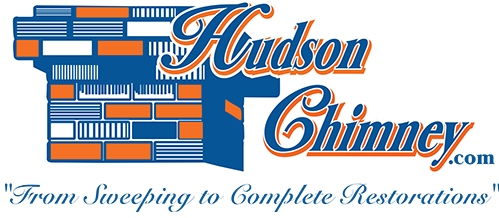by Mark Hudson | Aug 20, 2015 | Chimney Crown Info
Just as you would think from the name, chimney crowns sit at the very top of masonry chimneys to prevent water and animals from getting inside the chimneys. A crucial part of a masonry chimney system, your chimney crown needs to be in good condition to best protect your chimney. If your crown is suffering from hairline cracks, your chimney could be in danger of even more cracking and spalling damage. Luckily for the residents of the Jacksonville, FL area, Hudson Chimney specializes in repairing and building chimney crowns. We would like to tell you more about this important part of your masonry chimney by sharing with you some information from the Chimney Safety Institute of America (CSIA) about chimney crowns.
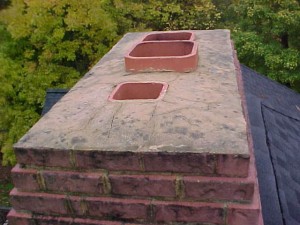
What exactly does a chimney crown do?
Covering the top of the chimney to seal it from the flue liner to the chimney edge, a chimney crown constructed by Hudson Chimney provides a downward slope to direct water from the flue to the edge of the crown. Without a chimney crown, the entrance to your chimney is wide open and can easily be invaded by water from rain and melted snow and animals such as birds, raccoons, and squirrels. Both water and animals will do a lot of potentially expensive damage to your masonry chimney, which is why it is so important to have a properly built chimney crown on the top of your chimney.
What kind of damage can water and animals do to my chimney?
The CSIA calls water the biggest enemy of masonry chimneys because it erodes away bricks and mortar. Hudson Chimney often sees spalling damage, which is caused when water that has penetrated masonry materials freezes within those materials, it expands. As the water thaws out, it forces the bricks and mortar to crack and break apart. If this type of damage is left untreated, the structure of your chimney is in jeopardy as it could collapse. The greatest type of damage done by animals has more to do with the nesting materials they leave behind in your chimney. Abandoned animal nests in a chimney create dangerous hazards such as fires ignited from the materials and debris and flue blockages that can cause poisonous gases like carbon monoxide to be forced back into your home.
What are the details of a properly built chimney crown?
Constructed from a Portland cement-based mixture, a proper chimney crown should be installed so that it provides an overhang projecting beyond all sides of the chimney by a minimum of two inches. Hudson Chimney additionally ensures that the flue liner tile projects above the crown also by a minimum of two inches.
Concerned about your chimney crown? Contact Hudson Chimney to inspect the condition of your crown and make recommendations for repairs or a rebuild. You can trust us to protect the inside of your chimney with a correctly constructed and installed chimney crown.
by Mark Hudson | Feb 26, 2015 | Top Sealing Damper
According to the Chimney Safety Institute of America (CSIA), a damper is an important component of every chimney. Essential for an energy-efficient home, the damper keeps the heat in and the cold air out of your house, which saves you money on heating bills. Your damper is also used to control the flow of smoke, gases, and the other byproducts of combustion up the chimney to exit your home. Available in two different types, you can choose between the throat damper and the top-sealing damper. Also known as the traditional fireplace damper, a throat damper is installed right above the firebox and is found in many old masonry chimneys. However, this type of damper has many flaws and issues. At Hudson Chimney, we strongly recommend the top-sealing damper over the throat damper. We would like to tell you more about the benefits of these dampers.
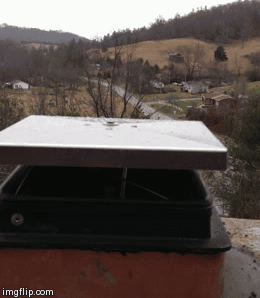
This clip is courtesy of Richie Baxley at Environmental Chimney Service in Asheville NC.
A top-sealing damper serves two functions, allowing you to “kill two birds with one stone.”
One of the main benefits of a top-sealing damper is that it also serves as a chimney cap when the damper is closed, and, to be honest, this type of damper actually gives you better protection than an ordinary chimney cap. Equipped with a silicone rubber gasket that seals in heat and air conditioning as a damper, a top-sealing damper also gives you an air-tight seal to keep out water, debris, birds, squirrels, and raccoons — just as a chimney cap would. When our customers need a new chimney cap, Hudson Chimney will recommend that they install a top-sealing damper instead of a chimney cap. Some models of top-sealing dampers come with caps, so even when the damper is open, your chimney is still protected from debris and animals.
A top-sealing damper will save you both energy and money.
Throat dampers just do not completely seal as well as top-sealing dampers. You will not have to worry about cold air, ice, and snow entering your flue to create a cold core in your chimney. A cold core tries to cool your home at the same time that your heating system is trying to warm it up, which wastes both fuel and money. As a top-sealing damper sits atop your chimney, cold air never even has a chance to get anywhere inside because your entire flue is sealed air-tight with the silicone rubber gasket. Believe us when we say you will save money on both cooling and heating bills when you install a top-sealing damper.
A top-sealing damper is easy to operate.
With some throat dampers, you must practically stick your head up the fireplace to open and close them. When you have a top-sealing damper, opening and closing the damper is simple. A stainless steel cable from the damper drops down the chimney and connects to an easily-accessible handle which is mounted inside the firebox. Different models will have different opening and closing methods, but Hudson Chimney guarantees you will find all easy to use.
Want to know more about the benefits of top-sealing dampers? Contact Hudson Chimney to find out even more advantages to this type of damper.
by Mark Hudson | Feb 6, 2015 | Chimney Service
Believe it or not, spring is on its way, and fireplace season will be slowing down. To be sure your chimney is safe after a long and cold winter, scheduling your annual chimney sweeping and inspection now is essential, especially if your chimney is in need of important repairs. At Hudson Chimney, one of our busiest times of the year is the spring, and if you procrastinate for too long, you may have to wait for several weeks before you can arrange an appointment for our certified technicians to visit your home to clean, examine, and repair your chimney. According to fire safety organizations such as the National Fire Prevention Association (NFPA), it is recommended you schedule a chimney sweeping and inspection once every year. We would like to share with you the important chimney maintenance steps our chimney technicians will take to find essential repairs needed to make your fireplace and chimney system safe.
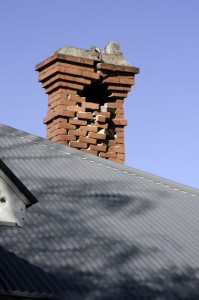
CHIMNEY SWEEPING
When the Chimney Safety Institute of America (CSIA)-certified sweeps at Hudson Chimney clean your chimney after winter, our main concern is removing all of the creosote deposits that have accumulated on the walls of your chimney. Forming naturally as the by-products of combustion (smoke, gases, tar fog, vapors, etc) exit the cooler walls of your upper chimney, creosote is the highly combustible result of the condensation that occurs. Creosote can be either black or brown, and its appearance can vary. Whether it is sticky and gummy, crispy and brittle, or shiny and hard, creosote, especially in large amounts, is extremely flammable, which makes it the cause of a majority of chimney fires. Getting rid of these creosote buildups after winter’s heavy fireplace usage is essential to the safety of your chimney.
CHIMNEY INSPECTING
Hudson Chimney takes pride in performing detailed post-winter chimney inspections because we want to find any damage that needs repairing to ensure the safety of your fireplace and chimney. Of course, we seriously examine every part of your chimney; however, there are specific repairs we are looking for, including the following:
damaged or deteriorated masonry — Loose bricks and chipped mortar on the exterior of your chimney are sure signs of water penetration damage, and this alerts us to the possibility of water leaking inside your chimney that creates even more damage to its interior. If this masonry damage goes unrepaired, you will end up with costly repair work, including a possible rebuild of your entire chimney.
cracks in the chimney cap — Your chimney cap serves as protection from both water and animal intrusions of your chimney. A deteriorated chimney cap serves no help at all to your chimney. We can repair cracks and other damage to chimney caps as well as install new caps if the existing caps are beyond repairing.
cracks and holes in the chimney flue liner — Water leaks can cause serious damage to the liner of your chimney that can endanger your family’s health. A deteriorating flue liner allows toxic gases like carbon monoxide to leak into your home. Repairing or replacing a damaged chimney flue liner will keep those gases exiting out of your chimney instead of infiltrating the interior air of your home.
Save yourself the hassle of waiting for weeks to maintain your chimney after winter by contacting Hudson Chimney now. We are happy to schedule an appointment for your annual sweeping and inspection as well as perform all necessary repairs.
by Mark Hudson | Oct 15, 2014 | Chimney Cap
Does your chimney have a cap? A chimney cap may seem insignificant and maybe not that important, but it serves a variety of functions to protect your chimney and home! The Chimney Safety Institute of America suggests that all chimneys have caps as a preventative measure against damage and for safety reasons. If you do not have a chimney cap or your chimney cap needs to be replaced, it is important that you call Hudson Chimney as soon as possible to install a cap in order to prevent the damages associated with not owning one.
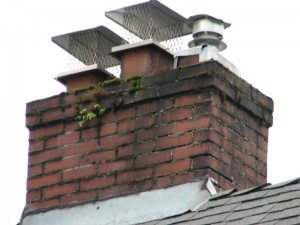
There are many reasons why it is important to keep your chimney capped. A chimney cap stops rain from getting into your chimney, preventing water damage to both your chimney and your home. Water damage can cost you a lot of money in repairs as well as destroy your chimney if not confronted quickly. While a chimney cap is important to preventing water from entering your chimney, water damage can also be prevented by having the professionals at Hudson Chimney apply a sealant to the exterior of your chimney.
A chimney cap also keeps animals out of your chimney, which can create noise, smells, and provide them an entrance into your home. Chimney caps prevent environmental debris, such as sticks and leaves, from entering your chimney as well, which can cause dangerous chimney fires. Having debris or animals in your chimney can also block smoke and fumes from efficiently leaving your chimney, which will lead to improper ventilation that will not allow dangerous fumes to exit your home. Because they prevent things from entering and blocking your chimney, chimney caps ensure that your chimney’s air flow runs efficiently. Chimney caps also help to eliminate downdrafts, which blow cold air as well as fumes from your fire back into your home. A chimney cap also protects your chimney liner and prevents sparks from flying out of your chimney and lighting things on fire.
If you are looking for a sturdy and durable chimney cap that doesn’t rust, Hudson Chimney can install a stainless steel cap for you. However, you also have the options of having a copper, galvanized, or aluminum cap installed. Consult with an expert at Hudson Chimney to determine the best cap for your chimney. No matter your choice, chimney caps are one of the least expensive chimney repairs that can be made as well as one of the simplest. Therefore, it makes financial sense to have a chimney cap installed rather than waiting for damages to occur that will cost you more!
So if you don’t have a chimney cap or if your chimney cap needs to be replaced, give Hudson Chimney a call as soon as possible. The professionals there will be sure that you have a cap installed that will protect your chimney and home.
by Mark Hudson | Sep 15, 2014 | chimney maintenance
Chimney service companies tend to get busy as the fall and winter approach. If you live in the Middleburg, Florida area you may think that booking an appointment to have your chimney swept and inspected is something that can wait. After all, you live in the sunshine state, right? But you would be wrong. The Chimney Safety Institute of America recommends that chimneys be swept by a professional on an annual basis. No matter where you live, the fall and winter are when chimney service companies get booked up. If you want to use your chimney safely and efficiently this winter, you will want to have the professionals at Hudson Chimney clean and inspect it.
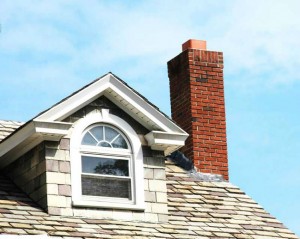
Having your chimney cleaned and inspected can help it to run more efficiently, save you money, and keep your home warmer. Most importantly, however, having your chimney cleaned is important to keeping your home safe from house and chimney fires, carbon monoxide poisoning, and other hazards presented by owning a chimney.
The professionals at Hudson Chimney will work to remove creosote from your chimney. Creosote is an extremely flammable substance that forms when hot gasses and smoke cool in your chimney. Not only can creosote cause fires, but it blocks toxic gasses and smoke from leaving your chimney. When creosote is allowed to accumulate, not only does your risk of fire and dangerous fumes increase, but creosote will build into a caked on substance called glazed creosote, which can only be removed by a professional with strong chemicals. Having your chimney cleaned and inspected annually can help prevent glazed creosote from forming.
The experts at Hudson Chimney will also inspect your chimney for water damage which can cost you a lot of money (and even destroy your chimney) if not properly attended to. They will inspect your chimney for the various causes of water leaks and recommend any repairs that need to be made. You can then set up an appointment with Hudson Chimney to install a chimney cover, have a water repellent applied, or anything else that needs to be done to provide you with a leak-free chimney!
Your chimney will also be inspected to make sure that the appliance was properly installed and that your chimney and appliance are compatible. A flue that is too small for the appliance will not allow for proper ventilation, causing hazardous fumes to enter your home. A flue that is too big for the appliance will accumulate creosote quickly. The technicians at Hudson Chimney will also check to make sure that there are no blockages in your chimney that could cause improper ventilation. Having a chimney cap or damper installed will help to prevent animals and debris from entering the chimney.
So if you have not scheduled your chimney service appointment for this year, call Hudson Chimney as soon as possible to book your appointment before the busy season starts!
